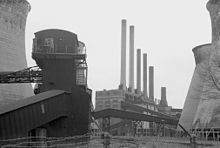
Brimsdown Coal Fired Power Station served many heavy industries on what is now the Lea Valley Industrial estate. Credit: Wikipedia
On September 3rd 1939, the day war was declared, my sister Rene and I came to Harpenden. Our home was in Enfield, not really very far from here, but it was situated near the industrial estate in Brimsdown, a possible target for enemy bombers. As a result, because of our close proximity to a munitions factory, our parents decided that we should take advantage of the evacuation scheme.
We had a brother, Brian, six months old, and a three year old sister, Doris. Rene was eight, and I was six. The two younger children stayed in Enfield with our mother. Father was already in the Army, having gone straight from Territorial camp when the outbreak of war was imminent. He actually did not come home again until January 1940, and therefore was not involved in the plans for our departure that day.
I remember on that Sunday morning feeling quite excited because we had been sent to a shop near our home to buy new face flannels and toothbrushes for Rene and myself; obviously we were going away. The small amount of clothing and possessions we were allowed to take were packed in a small suitcase and a brown paper parcel, and, of course, we had our gas masks.
Off to the seaside?
We were taken to the bus waiting at the top of our road, and labelled with our name, not knowing where we were going, but we assumed that it would be the seaside. It must have been terrible for the Mothers and Fathers to send their children away, because they had no idea of our destination, or who we would be staying with. Some children were rather distressed and crying, but Rene and I seemed to be looking forward to this holiday – but the feeling changed later on at bedtime that evening.
After a reasonable journey during which we ate the food that Mum had prepared for us, with the exception of the bananas, which we managed to sit on, we arrived in Harpenden and were taken to St Nicholas Church School. We were given refreshments and a carrier bag containing tinned milk, cocoa, corned beef and a bar of chocolate, etc. to take with us.
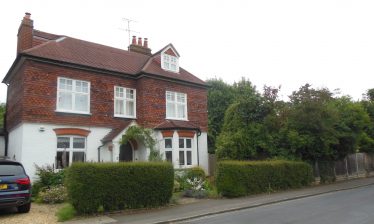
4 Tennyson Road – in 1939 the garden extended to Sun Lane. Credit: Rosemary Ross, July 2014
Having had that short break we were taken on the bus again to the garden of 4 Tennyson Road, our distribution point, where we sat on the grass waiting to be chosen by someone and taken to their home. Rene had no intention of going anywhere without me and eventually Mrs Cooper (Auntie Ivy) agreed to take both of us. She was quite a young woman at the time and had not been married very long. The experience of sitting waiting in that garden I found very upsetting, but we were reassured by Auntie Ivy who tried very hard to make us feel at home.
After lunch which must have been just as daunting for her as for us, it was decided that we should go for a walk on the Common, where we could not understand being encouraged to walk on the grass, since in Enfield parks we had to keep to the paths.
Bedtime that evening was not happy. I remember we were in a strange room, sleeping on an even stranger bed. My bed consisted of a straw palliasse placed on a camp bed and I certainly did not feel at home. Next morning we were given printed cards to fill in and to send to our mother with our address on.
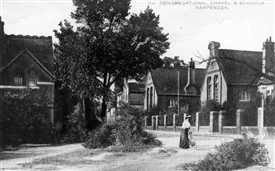
Victoria Road schools in the early 1900s – the Harpenden pupils moved to Manland school in 1939. Credit: LHS archives
During the first few months after our arrival here our education was very erratic. The schools were overflowing because of the arrival of so many refugees. However, we had classes in various buildings: the Public Hall, Park Hall (now the Town Hall), and also at Vaughan Road School (later the library). Certainly until Spring 1940 our schooling was only part-time: the rest of the day was taken up with nature walks and games on the Common. Rene remembers this time with delight; it gave her an opportunity to indulge in her favourite hobby, reading. She was a very frequent visitor to the public Library which at that time was on the ground floor of Harpenden Hall, and run by the very long-suffering Miss Wood.
Our group of evacuees took over Vaughan Road School, and, with our teachers, we had a relatively comprehensive education. Mr Wilton, headmaster, Mr Woodbury and Mrs Wise are names I remember. Mr Woodbury was a rather eccentric man with an unusual approach to teaching. If, during History lessons we could not remember dates he would paint them on the wall with red paint. Once, when life must have seemed dull to him he stopped the lesson and we were asked to follow him round the playground singing “McNamara’s band”. The lesson was then resumed. His reward to the children for good results was not a star or merit mark, but the award of the Grand Order of the Golleybar, and since sweets were on ration, this was very popular. Mr Woodbury also ran a club after school where we could get snacks.
At this time the number of children at school decreased slightly, because there was a lull in the bombing of London and some people went back home. The all-out attack had not yet started but the blitz began with a vengeance, and things changed. Mum was still in Enfield with the younger children, living in the Anderson Shelter at night when the raids started. Conditions were very bad and our little sister Doris developed quite severe health problems.
Joined by Mother and the little ones
Auntie Ivy, our ‘billet lady’, invited Mother and the two little ones to come to stay with us in Harpenden. Marvellous for us, but rather cramped for her. We managed to fit everyone in, and on conventional mattresses, but my bed was still the palliasse, which by then I was used to. Approximately once a month I would go to Smith’s, the Corn Chandlers shop in the High Street (no.60?) to collect a sack of new straw for my bed.
After a while Mum realised that the education Rene and I were having was not as good as she would wish, so she decided to enrol us at St Nicholas Church School. She quite rightly gave our address to the Headmaster as Tennyson Road, and he quite happily accepted us. However, after four months he was told that we were evacuees and we were asked to leave. We had made new friends at the school and I found the move back to Vaughan Road very upsetting.
Discrimination
Once again we went back to our old school and the less formal type of education. Eventually, having passed the scholarship at eleven years old I was eligible to go to Grammar School. Yet again, the fact that I was an evacuee was not in my favour. It was decided by the Herts Education Authority that if I was to go on to Grammar School it would have to be in Enfield or Tottenham, not Hertfordshire, because we did not come from this county. Since the VIs (doodlebugs) were being launched over Southern England at that time, for a child to travel to North London each day was ludicrous. Mum wrote letters to various dignitaries and organisations about this but to no avail.
For most of that winter term of 1944, and in spite of the extra hours Mum worked to support four children, she helped me keep up my school work at home. Finally, just before the Christmas holidays Mum had a letter from Miss Garton, Headmistress of St Albans Girls Grammar School to say that an unexpected place had become available in the school and she would like to interview me to see if I was suitable. I was accepted by the School, but because we were not considered permanent residents of Hertfordshire, we had to pay part of the tuition fees as well as buying some books. I stayed there until I was seventeen years old.
Returning to my time at Vaughan Road, our route to school was along Carlton Road from Tennyson Road, and St George’s pupils also used Carlton Road. We had a slightly uneasy relationship with them, and I remember minor skirmishes if we walked on their side of the road. There was certainly an atmosphere of Them and Us, but nothing deadly serious ever happened between the two groups.
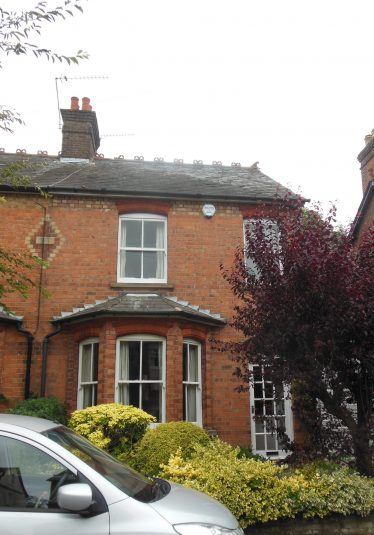
Our billet, with Mrs Ivy Cooper, 10 Tennyson Road. Credit: Rosemary Ross, July 2014
It seems impossible, but the three bedroomed house at no.10 (Tennyson Road) for a short time accommodated three adults and five children. When our aunt’s house in Edmonton was damaged by bomb blast during the blitz she and her daughter came to stay with us until repairs could be carried out. Our Aunt and cousin had the sitting room as their bedroom and Rene and I shared Auntie Ivy’s bedroom which was fortunately rather large. Auntie Ivy’s husband was conscripted shortly after the war began and sadly was killed a few years later.
Food rationing presented a few problems with such a large household but none of us can remember being hungry. Adults had to be very clever padding out the meat ration with lots of vegetables and stretching what rations we had, but we certainly did not feel deprived. We all had sweet rations, and having eaten your quota, that was that. Unfortunately a member of our household used to store up her sweets, and since I had a very sweet tooth, this was a terrible temptation for me. Once I was discovered raiding her supply – enough said!
Our house in Tennyson Road backed onto the railway, and since it was near a junction the trains quite often stopped at the bottom of our garden. We used to sit on the fence and talk to the soldiers in the troop trains, and in the Autumn would throw apples from our trees down to them. We were unable to catch anything they might have thrown back because the bank was too steep.
Eking out the rations
Mum became a cook at Vaughan Road School so she knew that we were having adequate lunches. Also on occasions the local Firemen and Police would use the school canteen for lunch. Any scraps of food left over at school or home were collected and placed in bins used to feed pigs. Most areas had bins for this purpose. In some places ‘pig clubs’ were in existence and a share of the pig could be bought. And the meat was shared out when it was slaughtered.
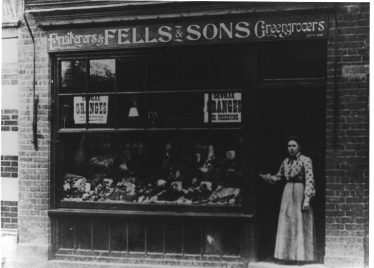
Fells, Greengrocers, 8 Station Road, c.1910. Credit: LHS archives, G. Woodward collection – LHS 3466
There were times when a whisper would go round that Mr Fells the greengrocer was expecting a delivery of bananas. His shop was in Station Road. We would be sent with Brian’s green ration book (a baby’s), and we queued for quite a long time, sometimes, for these rare fruits.
We were encouraged to collect rose-hips, rich in vitamin C, to supplement the diet of young children, since citrus fruits were not usually available. Collecting these was a very tedious and prickly occupation. When a reasonable amount of hips were acquired we took them to the WRVS office above a shop next to the Post Office. I believe we were paid a small sum for them. Another way to support the war effort was to collect salvage. We saved wrapping paper, although the shops tried not to use it if it was at all possible. Newspapers were saved, and metal, cardboard, rubber and tins were collected and sorted.
Sheltering under the stairs
We did not have an Anderson shelter in our garden for protection against air raids, and the next safest place was considered to be the cupboard under the stairs. As I mentioned earlier, at one time there were five children and three adults in the house, far too many to squash in a cupboard. The alternative was to shelter under the dining room table. Both of these places had mats which we could lie on if necessary. As soon as the warning siren sounded we would disappear into one of these. The cupboard under the stairs had a tin of sweets, mostly clove balls, boiled sweets, and I think we had biscuits as well, obviously in case we had to spend a long time in there. It seems we used to start eating as soon as we went into the cupboard, happy to use any excuse. Each evening a sheet of asbestos was fastened against the window in the dining room to prevent glass from coming in if there was a blast from a bomb.
At school when the siren sounded we were ushered into the cloakroom, a central place in the building, where a blast proof wall was erected, and we stayed there until the ‘all clear’ sounded. Having to go there did not happen often, because most of the raids took place at night. Harpenden was fortunate, we had very little air raid damage, although I do know that incendiary bombs fell on a house and in the garden at Kinsbourne Green. On once occasion when the siren sounded while we were at home, we went into the cupboard and I think I must have gone to sleep; my head became wedged under the bottom step – rather an alarming experience.
We were, of course, urged to carry our gas masks at all times, and if we arrived at school without them as I did on one occasion, we had to go back home to get it. They were very uncomfortable objects to wear, but in a gas attack anything would be bearable.
Clothing and shoes must have been a challenge for our family of four children, but we managed and clothing coupons were only used when absolutely necessary. Materials were recycled and once Doris had a splendid coat and hat made out of an Aunt’s old coat, the material being reversed. Grey blankets were also used for coats, and with a little adornment, looked very smart.
Nylons from the USA
When we were older Auntie Hett, who was living in the United States, used to send us pairs of nylon stockings, priceless, but never both stockings in the same envelope. Whether it contravened the law, or whether she thought they might be stolen, I’m not sure. She also sent Knorr Suisse packet soups, which we loved; they were quite a new thing in England.
For entertainment we had the delight of wandering round Harpenden and out into the country and, of course, on reflection the sun always seemed to be shining. We had concerts at the Public Hall, with quite well-known artistes of that time: Charlie Chester and Stars in Battledress. Once we saw George Robey, much to the surprise of our parents, because he was hardly a children’s entertainer.
Once we were taken to London for a treat by a well-meaning person but it was a little difficult to find a theatre for us, so she decided to take us to something that looked interesting. Well, Rene and I were rather surprised when we found ourselves in ‘The Windmill’ (http://en.wikipedia.org/wiki/Windmill_Theatre).We can prove they never closed!
All in all we had a reasonably happy time here in Harpenden and we were more fortunate than some because Mum was with us and the two younger children. We stayed with Auntie Ivy until the war ended and Dad came home. As we did not have a home in Enfield to go back to when the war ended we were pleased to be given one of the first new houses at Batford. Dad got a job in Harpenden and settled for staying here. Mother became the cook at Batford Nursery School. Mrs Cooper (Auntie Ivy), our ‘billet lady’ married again after the war. We kept in touch with her until sadly she died in 2003.
When I left school I started training as a Medical Laboratory Technician at St Albans City Hospital where I met Keith Jennings of Harpenden, who was doing the same training. We married in 1955. Doris, Brian and Rene went to Manland School where they were happy and successful. I am now the only member of the family still living in Harpenden.

Comments about this page
I lived in this house (no 10) for a while as a child too (post war). How fun to see its history. We used to love watching the trains too. When we moved, it was too quiet to sleep at our new house as there was no huge goods train going past the house during the wee hours!
Add a comment about this page